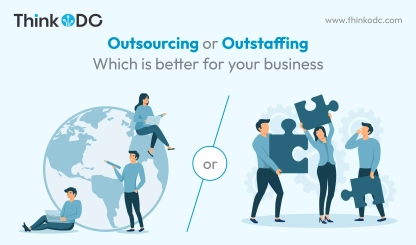These days, remote work has become very common, especially in tech jobs like computer programming. According to TechTarget, there has been a significant rise in remote work job postings within the tech sector in 2022. This reflects a growing trend in the industry towards remote jobs.
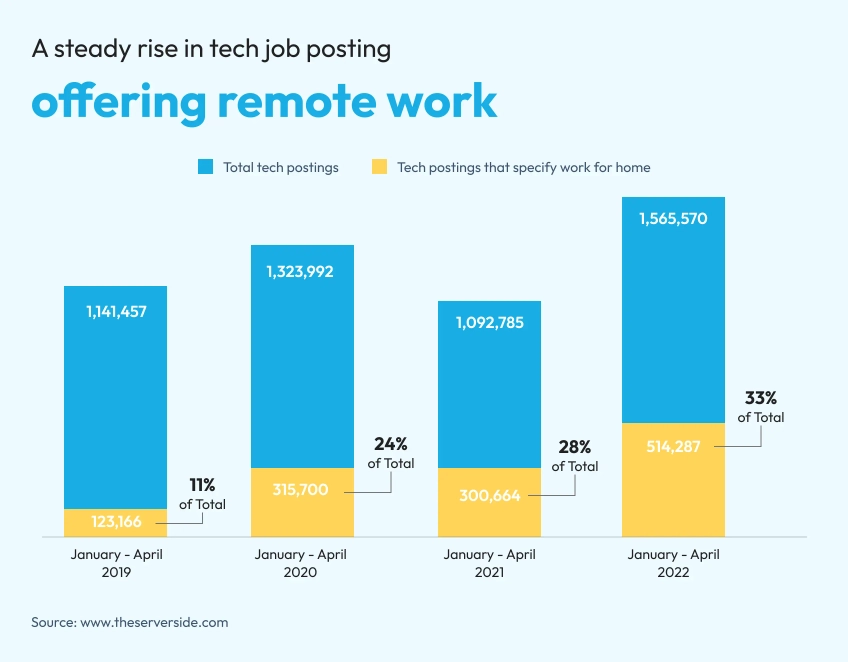
Having employees who can do their jobs from home provides good opportunities for companies and programmers.
But with that, it also creates some challenges. And one of them is keeping your best programming staff happy so they don't leave your company for another job.
As, you and your company have most likely spent a lot of time, money, and effort finding, hiring and training excellent programmers for your team. Thus, you want to keep them working with you for a long time, and not lose them to another company with better offers.
So how do you create a positive remote working experience for your developers that makes them want to stay loyal to your company? How do you keep them engaged and productive over the long run?
Here, we are going to explore proven methods companies use to hold onto their best remote programmer staff. But, before we get into that, let's know about the common challenges in remote developer retention.
Challenges of Retaining Remote Developers
Working from home sounds pretty great, right?
You get freedom, flexibility, and a comfy home office – what's not to love?
Well, while it does have its perks, it can also make it hard for companies to keep their talented programmers around long-term.
So what types of things might make your star programmers think about taking a job somewhere else? Let's explore some common challenges remote programmers face:
Remote Work-Specific Challenges:
Developers face many challenges, whether it is related to work or their general problems. Here are some of the top challenges that a programmer faces when working remotely:
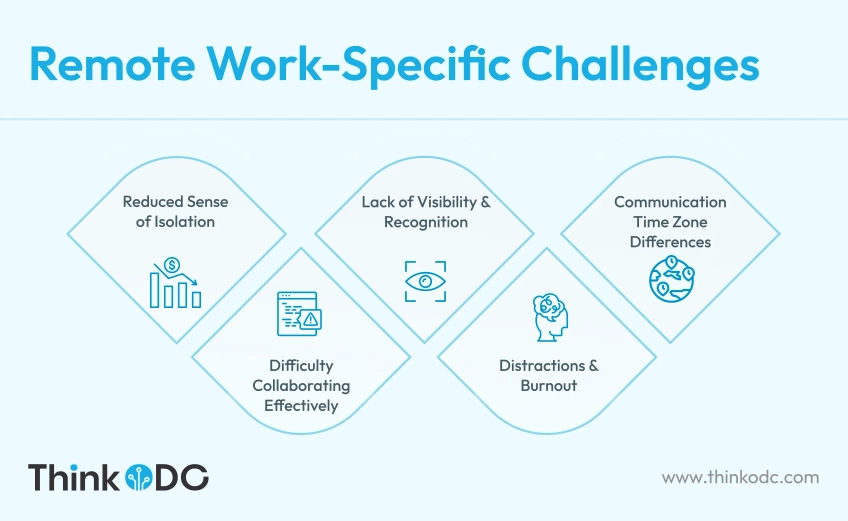
Reduced Sense of Belonging and Isolation:
Picture working very hard on a project and doing excellent work, but no one notices, appreciates or says “Great Job.” Many remote programmers struggle with feeling isolated like this.
They miss the casual interactions, the water-cooler gossip, and the spontaneous brainstorming sessions that naturally happen in an office environment. Without these little connections, remote programmers can feel detached, lonely, and dissatisfied over time.
Note: 53% of remote workers say it’s harder to feel connected to their coworkers.
Difficulty Collaborating Effectively:
Things like brainstorming new ideas, solving issues together, or celebrating team wins are key for a positive company culture. But collaboration takes more effort when working from home.
Time zone differences, communication gaps, and a lack of informal interactions can all stymie good teamwork. This may hamper progress and reduce developer job satisfaction.
Lack of Visibility and Recognition.
Remote programmers often worry that their bosses do not see their daily work or how much effort they put into it. They are concerned that their efforts will go unnoticed and that they will miss out on opportunities for advancement.
Feeling invisible in this way may gradually reduce their loyalty and positivity, leading them to consider other job opportunities.
Distractions and Burnout:
Note: According to a survey, 51% of employees are experiencing burnout symptoms while working from home.
WFH (Work From Home) allows flexibility but also brings distractions. Remote programmers have to resist doing household chores, responding to family needs, or watching Netflix instead of working. Battling continuous interruptions and temptations makes it hard to stay focused and productive.
Also, as per the report, employees who work from home spend 1.4 more days per month than their office counterparts. That equates to 16.8 additional days per year. This can spur feelings of being overwhelmed and lead to burnout.
Communication Challenges and Time Zone Differences:
For teams spread across different time zones, coordinating schedules and meetings can be a logistical nightmare. This can lead to missed opportunities for collaboration, reduced productivity, and potential resentment among team members.
General Developer Retention Challenges
While these challenges are specific to remote work, some general issues also impact whether programmers stay or leave:
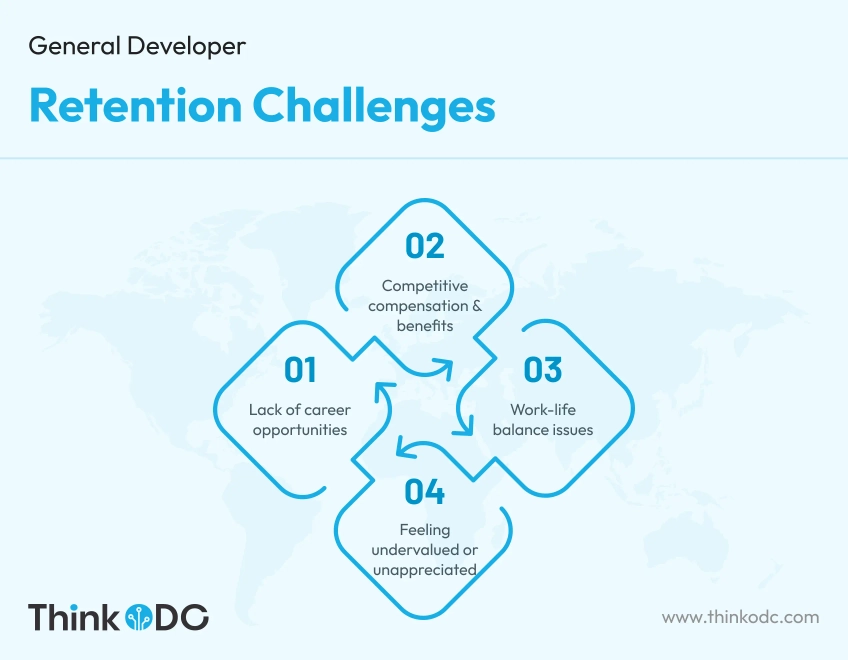
Lack of career development opportunities
Developers are hardworking and ambitious people. They thrive on learning and expanding their skills, and they want to feel like their careers are progressing.
If they feel stuck with no learning and advancement opportunities, they’ll likely job hunt elsewhere for better opportunities and growth.
Competitive compensation and benefits
In today's tech market, which is so competitive, top developers can choose from the best opportunities. To attract and retain the best talent, companies must offer competitive compensation packages that include not only salary but also attractive benefits and perks.
Work-life balance issues
Note: As per the survey, 53% of employees say a role that allows them to have a greater work-life balance and improve their well-being is “very important” to them.
Finding the right balance and maintaining a healthy work-life balance is difficult for many coders, and it's even more difficult for remote developers, who may struggle to set boundaries and disconnect from work.
If not managed properly, this can lead to burnout, stress, and a decline in their overall well-being, affecting both their work performance and personal life.
Feeling undervalued or unappreciated
Developers need to feel appreciated and recognized for their contributions. When they feel ignored, overlooked, or undervalued, their motivation and engagement plummet. This can lead to decreased productivity, a negative attitude towards the company, and ultimately, a higher turnover rate.
Proven Strategies for Remote Developer Retention
Alright, now that we've identified the challenges, let's find out the solutions for that. It's time to transform your remote work environment into a thriving hub where developers feel valued, connected, and excited to come to work (even if it's just their home office).
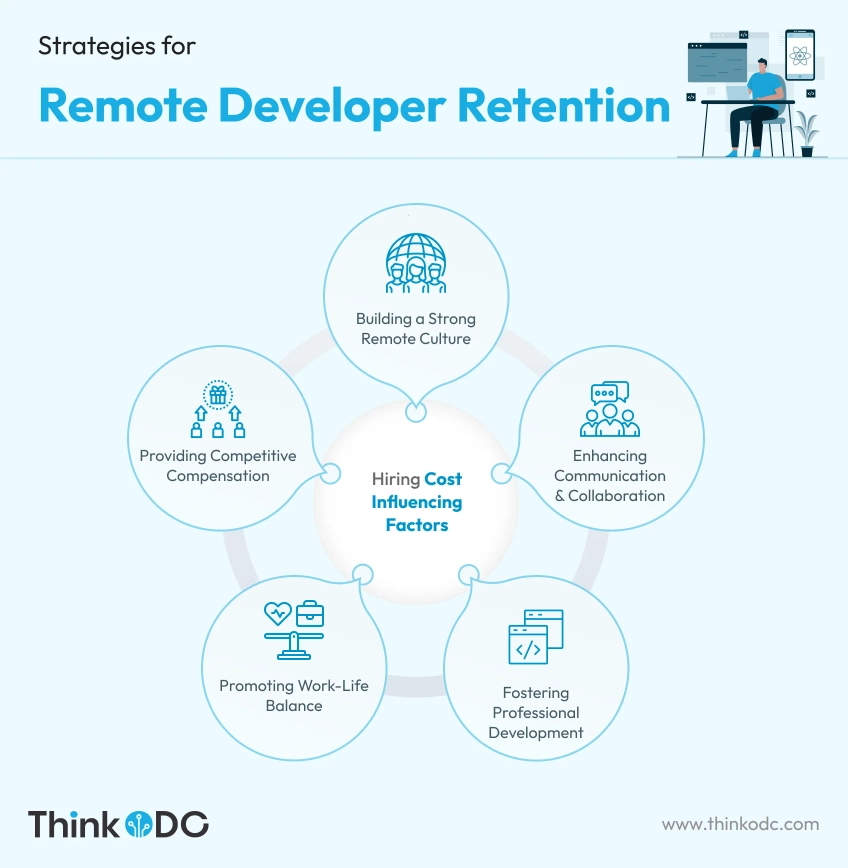
So, let's look into the proven strategies for remote developer retention:
Building a Strong Remote Culture
Think of your company culture as the foundation of your remote work environment. It's what binds your team together, fosters a sense of belonging, and drives engagement.
Here's how you can create a strong remote culture:
-
Be Transparent and Mission-Driven: Clearly communicate your company's values, mission, and vision. Share your goals and challenges, and encourage your developers to see how their work contributes to the bigger picture.
This fosters a sense of purpose and belonging, making them feel like they're part of something larger than themselves.
-
Team Building Goes Virtual: Just because your team isn't physically together doesn't mean you can't have fun and build strong relationships. Organize virtual team-building activities like online games, virtual coffee breaks, and even online social gatherings.
These activities help break the ice, foster genuine connections, and create a more positive work environment.
-
Talk It Out: Open Communication is key, so make it a top priority. Encourage open dialogue and feedback loops, both positive and negative. Utilize various communication channels like video conferencing, chat platforms, and project management tools to ensure everyone stays connected and informed.
-
Embrace Remote-Friendly Tools and Tech: Invest in tools and technologies that make remote work easier and more efficient. Project management software, online collaboration platforms, and communication tools can help streamline workflows, improve communication, and keep everyone on the same page.
-
Trust and Autonomy: Unleashing potential remote work thrives on trust and autonomy. Empower your developers by giving them ownership of their tasks and projects. Trust their judgment and allow them to work independently. This fosters a sense of responsibility, creativity, and motivation.
Enhancing Communication and Collaboration
Collaboration doesn't have to suffer in a remote environment. Here's how to keep your developers connected and working together seamlessly:
-
Regular Check-Ins and Meetings: Schedule regular check-ins and team meetings to keep everyone updated on progress, discuss challenges, and share ideas. Utilize video conferencing tools to make it more personal and interactive.
-
Tools Are Your Friends: Master the art of utilizing project management and communication tools effectively. Use these platforms to manage remote developers, assign tasks, track progress, share files, and collaborate on projects in real time.
-
Knowledge Sharing is Power: Encourage knowledge sharing and collaboration among team members. Organize knowledge-sharing sessions, pair programming sessions, and internal hackathons to foster learning and innovation.
-
Set Clear Expectations and Deadlines: Define clear expectations and deadlines for projects and tasks. This helps everyone stay on track, avoid confusion, and ensure timely completion of work.
-
Give Them a Voice: Create a safe space for remote developers to voice their concerns, ideas, and feedback. Listen actively and address their concerns promptly. This shows that you value their input and helps build trust and understanding.
Fostering Professional Development and Growth
Keeping your developers engaged and motivated requires continuous learning and growth opportunities. Here's how you can help them develop their skills and advance their careers:
-
Learning Never Stops: Offer online training and development programs to help your developers acquire new skills and stay on top of industry trends. Encourage participation in online courses, webinars, and workshops to expand their knowledge and expertise.
-
Industry Exposure Matters: Support your developers' attendance at industry conferences and events. This allows them to network with peers, learn from experts, and gain valuable insights into the latest technologies and trends.
-
Mentorship and Coaching: Implement mentorship and coaching programs to provide your developers with guidance and support. Pairing them with experienced colleagues can help them accelerate their learning, overcome challenges, and navigate their career paths.
-
Career Growth Within the Company: Create internal career advancement opportunities. Develop clear career paths and provide opportunities for your developers to move up within the company. This motivates them to stay engaged and strive for excellence.
Promoting Well-being and Work-Life Balance
Remote work can blur the lines between work and personal life. Here's how to promote a healthy work-life balance and ensure your developers' well-being:
- Flexibility is Key: Offer flexible work schedules and encourage developers to take time off. This allows them to manage their personal commitments and avoid burnout. Promote the idea that "always being available" is not the norm, and encourage them to disconnect after work hours.
Note: The ability to have a flexible schedule is the most important benefit of working remotely, according to 32% of employees.
-
Wellness Benefits and Resources: Offer wellness benefits and resources to support your developers' physical and mental health. This could include access to fitness programs, mental health support services, and online mindfulness workshops.
-
Healthy Work Habits: Promote healthy work habits and encourage developers to establish boundaries. This includes taking regular breaks, setting working hours, and avoiding multitasking. Encourage them to create a dedicated workspace separate from their living space to maintain a clear separation between work and personal life.
-
Lead by Example: Don't just preach about work-life balance; practice it! Leaders play a crucial role in setting the example. Disconnect after work hours, avoid sending late-night emails, and encourage your team to do the same.
- According to a Forbes report, 71% of remote workers said remote work helps balance their work and personal life.
Providing Competitive Compensation and Benefits
Retaining remote developers means recognizing their value and offering competitive compensation and benefits packages. Here's how you can show your appreciation:
-
Compensation Reviews and Adjustments: Conduct regular salary reviews and adjustments to ensure your developers are compensated fairly and competitively. Benchmark their salaries against industry standards and adjust accordingly to retain their talent.
-
Comprehensive Benefits Packages: Offer comprehensive health insurance, retirement plans, and other benefits that support their well-being and financial security. Consider additional benefits specific to remote workers, such as co-working space memberships or equipment allowances.
-
Recognition and Rewards: Recognize and reward exceptional performance. This could be through public acknowledgements, bonuses, or other incentives. Make them feel valued and appreciated for their contributions to the team.
Conclusion
Retaining your remote developers isn't just about offering benefits and perks, it's about creating a positive and supportive work environment that fosters growth, connection, and well-being.
By implementing these remote developer retention strategies and investing in your team, you can build a successful and thriving remote work culture where your developers feel valued, engaged, and happy to be a part of your company.
Why hire dedicated remote developers From ThinkODC?
Achieve long-term business growth by hiring dedicated remote developers from ThinkODC. We offer skilled developers globally, proficient in the latest technologies and frameworks.
Our thorough hiring process guarantees developers with not just technical prowess, but also effective communication skills, business domain knowledge, and a solutions-oriented mindset. ThinkODC developers smoothly blend into your team, providing fresh perspectives that foster innovation.
If you're in search of experienced professionals to build high-performing remote developer teams, accelerating your market share gains, ThinkODC is your ultimate destination.


